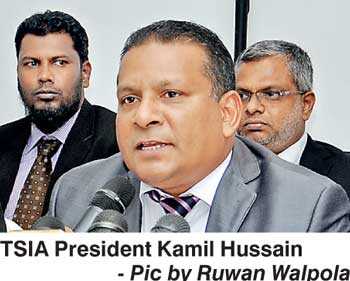Wednesday Feb 18, 2026
Wednesday Feb 18, 2026
Friday, 26 October 2018 00:00 - - {{hitsCtrl.values.hits}}
 By Uditha Jayasinghe
By Uditha Jayasinghe
Taking a bold stand against protectionism, the Tiles and Sanitary ware Importers Association (TSIA) yesterday called on the Government to maintain existing tax rates, insisting that any changes would increase costs unfairly for consumers and hamper the construction industry.
Responding to appeals by local tile and ceramic companies to reintroduce a Cess that was reduced in 2016, TSIA pointed out that the three local companies, which are owned by two individuals, already made significant profits off the existing taxes. Importers already have to pay 110% import duty as well as other taxes and any additional increases, together with the depreciating currency, would result in prices being increased, which would be unfair for consumers.
TSIA also noted that local producers already had about 51% of the market share and were given preferential treatment in government tenders, allowing them to take advantage of a biased system. Of the estimated Rs. 25 billion industry, importers account for about Rs. 12 billion and employ roughly 10,000 workers both directly and indirectly. The importers also pay about Rs. 6 billion annually in taxes, contributing significantly to public revenue.
“As an organisation of responsible importers, we are not against supporting local producers but if any country focuses only on local producers and allows a monopoly to develop then that is bad for the consumers. Imports ensure there are competitive prices and variety in the marketplace. No longer do we have a situation where a tiled bathroom is a luxury, it is now a basic need. Most Sri Lankans have to work for a lifetime to build a home and increasing taxes on tiles and sanitary ware will only make this situation worse,” TSIA President Kamil Hussain told reporters.
Dismissing statements by local companies that TSIA was helping dump substandard products in the local market, the organisation emphasised that importers had worked with the Government over the last decade to reduce this problem almost completely.
“The statement that we are importing junk products and dumping them in Sri Lanka is a myth. All the tiles imported to Sri Lanka have SLS certification, which is in line with ISO standards. The SLS institute has an office on the customs premises and they certify samples of all imports before they are released to the market. However, there it is not mandatory for local producers to obtain similar certification before their products are released to the market,” said TSIA Immediate Past President D. Vigneshwaran.
Appealing to the Government not to sacrifice both the importers and the construction industry for the sake of three local producers, TSIA pointed out that these companies had enjoyed extensive tax benefits for many years but had failed to become exporters as the protection they had been provided with eventually made them uncompetitive. Hussain pointed out that the three main components of production - clay, glazing and firing - required significant resources that could not be met at competitive prices in Sri Lanka.
“Even the local producers import the clay and glazing they need, which means they are also contributing to the outflow of foreign exchange. This industry is very energy intensive and Sri Lanka has high power costs, so when all these costs are added up it makes local production less competitive. Our import cost per tile is about $ 3 on average but just the raw material cost for a local tile is higher than that. This is why they have remained uncompetitive,” Hussain said.
TSIA members argued that local companies had become inefficient to the point that they were also importing finished products and therefore had little reason to malign existing importers.
He also indicated that a large-scale tile and sanitary ware industry was not suitable for Sri Lanka because of the environmental consequences, noting that it was a sector more fitting for larger countries. TSIA currently imports from China, India, Vietnam, Indonesia and the United Arab Emirates. Hussain stated that even countries such as China had started placing restrictions on their manufacturers due to the environmental cost.
The International Monetary Fund (IMF) in a report earlier this year cited porcelain and ceramic manufacture as the seventh most protected industry in Sri Lanka.
“The most protected segments of the economy benefit from both high tariffs and para-tariffs. In addition, some sub-sectors have a third layer of protection on their inputs through selected tax holidays or exemptions. Consequently, the Effective Rate of Protection (ERP) for the top 10 most protected sectors reaches between 170% and 524% as of 2015.”
“Interestingly, some of the most protected sectors do not necessarily represent strategic development or high employment activities but appear effective in lobbying for protection,” the report said.